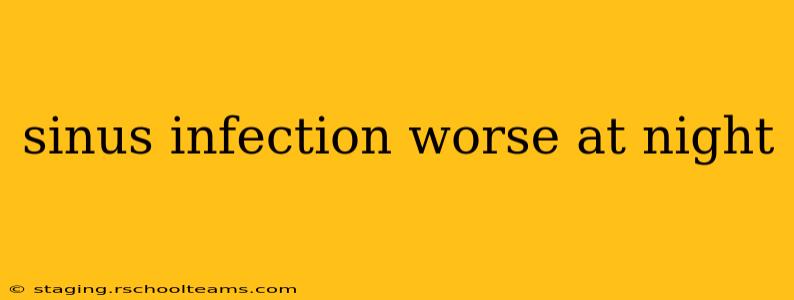Sinus infections, or sinusitis, are a common ailment causing inflammation and swelling in the sinuses. While discomfort can persist throughout the day, many sufferers find their symptoms significantly worsen at night. This nighttime exacerbation is a frustrating experience, impacting sleep quality and overall well-being. Let's explore the reasons why sinus infections feel worse at night and discuss effective management strategies.
Why Are Sinus Infections Worse at Night?
Several factors contribute to the intensification of sinus infection symptoms during nighttime hours:
-
Body Position: When you lie down, mucus that's accumulated in your sinuses tends to pool, putting increased pressure on the inflamed tissues. This pressure can lead to intensified pain and discomfort. Gravity plays a significant role here; during the day, when you're upright, drainage is facilitated.
-
Hormonal Changes: Some research suggests that hormonal fluctuations throughout the day, particularly at night, may influence inflammation levels. This could contribute to the worsening of sinus symptoms. However, more research is needed to fully understand this connection.
-
Dehydration: Many individuals drink less fluids at night, leading to thicker mucus. This thicker mucus can obstruct the sinuses, further increasing pressure and discomfort.
-
Temperature and Humidity: Bedroom environments can be significantly drier than other areas of the house. This dry air can further irritate already inflamed nasal passages, leading to increased congestion and pain.
-
Sleep Disruption: The pain and discomfort associated with a sinus infection can disrupt sleep, creating a vicious cycle. Poor sleep can weaken your immune system, potentially prolonging the infection.
What Can I Do to Relieve Sinus Pain at Night?
Managing nighttime sinus pain requires a multi-pronged approach:
Elevating Your Head: Sleeping with your head elevated can help prevent mucus from pooling in your sinuses. Use extra pillows or try a wedge pillow specifically designed for this purpose.
Staying Hydrated: Drink plenty of fluids throughout the day, including water, herbal teas, and clear broths, to help thin the mucus. Avoid alcohol and caffeine, as they can dehydrate you.
Using a Humidifier: A humidifier adds moisture to the air, helping to soothe irritated nasal passages and thin the mucus. Consider a cool-mist humidifier to avoid scalding risks.
Hot Showers or Compresses: The steam from a hot shower or a warm compress applied to your sinuses can help open up your nasal passages and relieve congestion.
Over-the-Counter Medications: Pain relievers like ibuprofen or acetaminophen can help manage pain. Decongestants can provide temporary relief from congestion, but should be used cautiously and as directed. Saline nasal sprays can help rinse nasal passages and thin mucus.
Nasal Irrigation: Using a neti pot or saline nasal spray can help rinse out nasal passages, removing irritants and mucus. Follow the instructions carefully to ensure proper hygiene and prevent infection.
When Should I See a Doctor for a Sinus Infection?
While many sinus infections resolve on their own, it's important to seek medical attention if your symptoms are severe or persistent. See a doctor if:
- Your symptoms last for more than 10 days without improvement.
- You have a high fever (over 101°F).
- You experience severe pain or pressure in your sinuses.
- You have yellow or green nasal discharge.
- You experience facial swelling.
This information is for general knowledge and does not constitute medical advice. Always consult with a healthcare professional for diagnosis and treatment of any medical condition.
